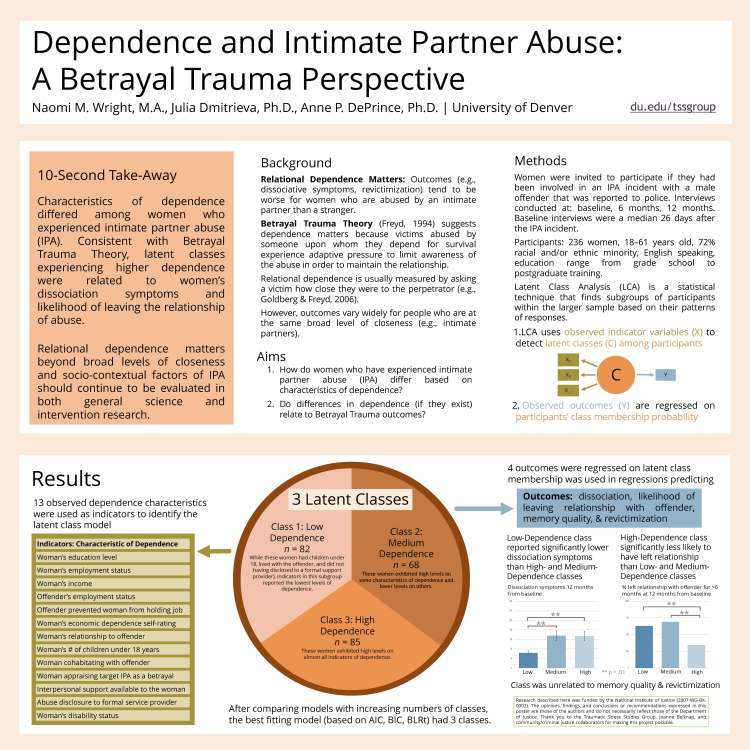On any given day, our team is doing research the connections between different forms of interpersonal trauma and a range of outcomes, from service use to distress. This approach was on display at the Annual Meeting of the International Society for Traumatic Stress Studies (ISTSS) in Boston earlier this month, where our team presented research related to domestic violence, sexual assault, elder abuse and refugee stress.
If you couldn’t join us in Boston, we’re bringing our work to you! Graduate student team members share summaries of the key findings they presented at the meeting along with links to posters below.
Domestic Violence and Dependence in the Victim-Offender Relationship
Naomi Wright described,”This study found that some women who experience intimate partner abuse depend on the offender, while others do not. These differences in dependence were important to identify, because they related to women’s outcomes.”
Older Adults’ Service Needs after Maltreatment Allegations
Julie Olomi summarized, “Our study sought to better understand the service needs and related barriers of maltreated older adults. We found that the majority of older adult participants expressed needing more help than currently received, including transportation, housing, food, household assistance, and medical and mental health care and that barriers to service used were ranged from logistical (e.g. did not know specific services existed) to psychological (e.g. experiencing shame at the thought of needing services).“
Domestic Violence, Social Support, and Help Seeking
Maria-Ernestina Christl described, “We found that women’s perceptions of how much social support they had was linked with the number of help seeking behaviors (like going to the police, seeking counseling, or contacting a victim’s advocate) they engaged in after an incident of intimate partner violence, depending on the severity of the incident. For example, if women reported that they had high social support and the incident was more severe, they engaged in fewer help seeking behaviors than women who experienced a less severe incident of intimate partner violence and also reported high levels of social support.”
Domestic Violence and Traumatic Stress Symptoms
Adi Rosenthal noted, “Previous research shows that post-traumatic appraisals (or feelings) such as alienation, shame, or betrayal are associated with higher post-trauma distress among women exposed to trauma. In the current study, we found that scores on a measure of cognitive abilities seemed to affect that relationship — for women with higher scores, the relationship between appraisals and post-trauma symptoms was buffered.”
Protective Factors among Refugee Caregivers
Julie Olomi presented on this “systematic review to synthesize evidence about protective factors that may support refugee caregivers’ mental health and well-being. Our review identified 11 categories of protective factors that were organized into three overarching domains: 1) social support, 2) structural supports, and 3) cognitive strategies. We concluded that the field is now ready more research on fathers, culturally-specific protective factors, and experimental designs to test the efficacy of promoting caregiver well-being via the identified protective factors.”





